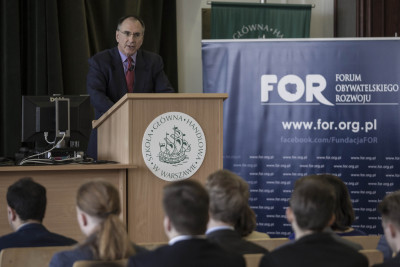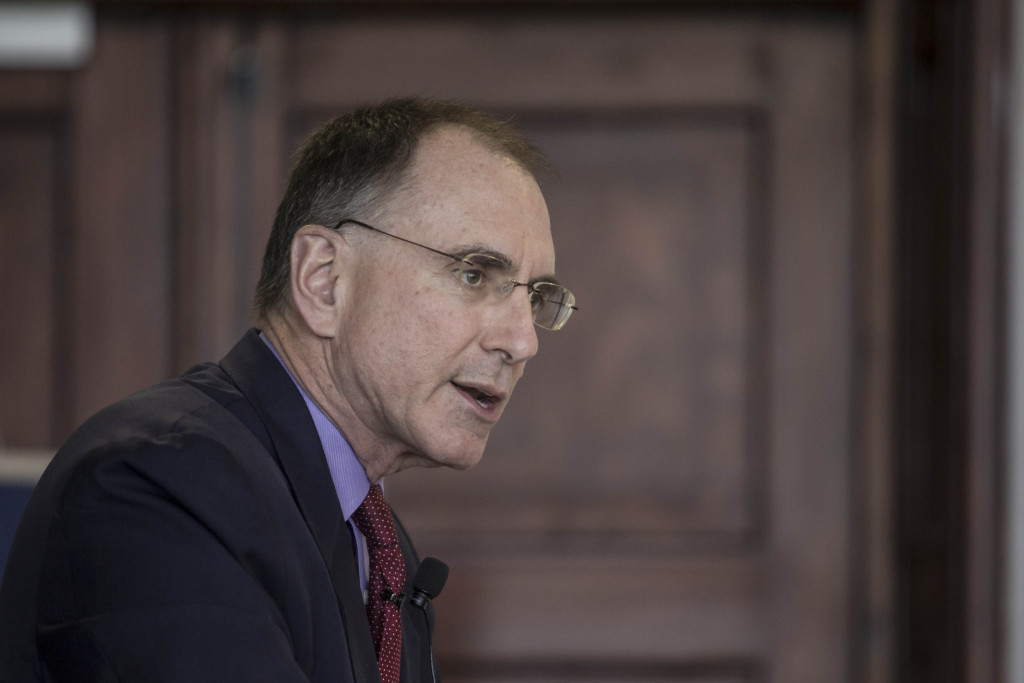For the last 38 years I have lived and worked in a very exciting and entrepreneurial place, namely, Silicon Valley in the San Francisco Bay Area of California. Silicon Valley is home to Apple, Google, Facebook, HP, Intel, Genentech, Salesforce, Twitter, Yelp, and many others. In these 38 years I’ve worked for large and small companies alike, some of which have gone out of business; and founded, grown, and sold two software companies, co-founded a third company, and invested in others. My book, Unleash Your Inner Company, is a distillation of what I’ve learned over the last 30 years. What can Silicon Valley tell us about entrepreneurship, and how can we create Silicon Valleys in Poland and Europe?
First to understand is that Silicon Valley has arisen organically over eight decades. Silicon Valley was not designed or planned, nor could it have been. No one could predict that thousands of mobile app developers would arise for mobile devices; which in turn would arise from cell phones and devices like the Palm Pilot; which would evolve alongside the Worldwide Web, laptops, and pagers; which would arise in parallel with gene sequencing, and so on. All of the seeds and soil that gave rise to innovations existed in the decade before each one, yet no one predicted, or could have predicted them. Even as late as 2003, no one predicted or could have predicted the incredible rise of Facebook, which was founded in 2004.
Unpredictability is not specific to Silicon Valley – it is a feature of all economies and innovation. The Santa Fe Institute in Santa Fe, New Mexico is a world-leading research center that focuses on complex systems. Economies, the environment, the human brain, innovation, and common law are examples of complex systems, meaning that order arises not by top-down design, but from the interactions of many agents, whether individuals, neurons, species, or companies. Negligible differences in initial conditions can give rise to large differences in outcomes, and if you try to control such systems, you get unintended consequences. So don’t try to predict them, and don’t try to control them.
Most of the hundreds of thousands of companies started in Silicon Valley over the decades failed. Growth comes from the companies that survive and grow; these are a small minority of all the companies that are founded. It is not enough to have a few, well-established “anchor tenant” companies. For a robust economic ecosystem, you need thousands of companies starting up, most of which will fail and a few of which will succeed and grow large.
 We have seen that 1) you cannot predict the winners in advance; and 2) you need a lot of startups, most of which will fail. So do not expect an arm of Poland or EU government, in particular, to choose a few winners to create a Silicon Valley here. Even highly rewarded and experienced venture capitalists get only one or two investments out of ten right.
We have seen that 1) you cannot predict the winners in advance; and 2) you need a lot of startups, most of which will fail. So do not expect an arm of Poland or EU government, in particular, to choose a few winners to create a Silicon Valley here. Even highly rewarded and experienced venture capitalists get only one or two investments out of ten right.
Especially with the many political forces that lead them astray, governments cannot choose winners or losers. A notable example is Solyndra, the solar energy company. Before Solyndra declared bankruptcy in 2011, the US Department of Energy and State of California together provided over half a billion dollars of loans, none of which was recovered. You don’t want to expose Polish taxpayers to that kind of Russian Roulette.
Governments cannot even predict winning or losing technologies, much less specific products and services. As I wrote in Forbes three years ago, in 2010 the U.S. Joint Forces Command warned that, “by 2012, surplus oil production capacity could entirely disappear.” Somehow they missed the fracking revolution, which would hugely expand US oil and gas production just two years later. In 2011, the U.S. Federal Communications Commission and AT&T saw a looming crisis: wireless was running out of spectrum. Somehow they missed WiFi, which would bypass and preserve the precious wireless spectrum, completely eliminating the crisis.
Many attempts, whether successes or failures, are also key to learning & ultimately to success in Silicon Valley. Each attempt is a learning experiment for the entrepreneur. If you don’t try to satisfy what you think is a customer need, you never discover where real customer needs lie. As a result, having one or more failures before your first success is very likely. Having worked for at least one failed startup is so common that it is just no big deal. Here’s a question and challenge: how might the same mindset and culture be widely adopted in Poland and in Europe?
So that is the benefit of failures. Regarding successes, everyone has heard of the huge IPOs like Google and Facebook, but for every very visible liquidity event like those are hundreds of much smaller liquidity events. Together, the few large liquidity events which each might benefit hundreds of employees, and the many smaller liquidity events which each might benefit a single founder or handful of co-founders, spread wealth very broadly across the region. Silicon Valley is the ultimate anti-poverty program. Such events have further given rise to both major venture capital firms and tens of thousands of smaller scale, angel investors, all of whom help launch the next cohort of startups, and complete the positive-feedback loop.
So those are factors contributing to Silicon Valley’s success, in my view. In my experience, the biggest obstacle to entrepreneurship, both in Silicon Valley and, for that matter, anywhere, is regulation. In most respects, technology has made starting new companies easier. Software has become more functional and smarter, and many services and technical courses are now available free online. But one main thing has made starting businesses harder: government regulation.
One small example. Over half of US states now require a license to braid hair. In some cases, braiders—many of them young black women who can ill afford the expense—must take irrelevant courses costing thousands of dollars. Many potential entrepreneurs, especially those with few skills and resources, are being blocked, and the numbers blocked grow each decade as regulations grow. They block the very men and women in society who find it hardest to find work and provide for their families in self-sufficient dignity. Still other regulations disallow life-saving drugs or ride-sharing innovations like Uber and Lyft. Such regulations do not improve quality of life. They generate revenue for governments and protect politically important lobbies from competition.
Let’s see graphically the effects of imposed regulations. Say that ten years ago, in some aspect of life, perhaps your health or the airspace above and around your home, what you are allowed to do by law was bounded by new regulations.
Now fast-forward ten years to the present. Regulations stay fixed while advances in knowledge, technology, and cooperation enable more dimensions of human needs to be satisfied that the regulations also preclude. During that time, perhaps, innovation has enabled intelligent drones, or Uber ride-sharing, or neurogaming helmets with sensors that detect your emotional state and incorporate it into game play. What had previously been a single dimension of possibilities excluded by regulation is now many dimensions of human needs disallowed by those same regulations.
But these figures oversimplify the situation. The actual situation is far worse. Long, complex, and subjective regulations are not clear, flat boundaries between what is allowed and disallowed but irregular and complex surfaces. These surfaces take more time and money to explore and comprehend, and impart more advantage to the well funded and well connected.
Creating ever more complex law to block loopholes is not the solution. That only further advantages the well funded, connected, and influential who can afford the best legal counsel and win exemptions. The only sustainable solution is fewer, simpler, and less obtrusive laws.
Over 100,000 health and fitness apps compete today, but relatively few in pharmaceuticals, aviation, construction, consumer banking, and medical devices. Why? Because these areas are more heavily regulated. Few of those health and fitness apps will survive. If even a fraction of them could address the opportunities in the other areas, those fields would see much more rapid advances, and humanity would be far ahead of where it is today. Simple laws are not necessarily good, but complex laws are almost certainly bad. I understand that the EU is promulgating an average of 17 new regulations every day. That’s bad.
So what can Poland and Europe do? The easy, popular, and ineffective way for government agencies and others to promote entrepreneurship include business plan competitions; elevator pitch competitions; and immediate, short-term tax incentives. I call these measures entrepreneurship theatre. They make us look good and the public feel good, but accomplish little. We are creating a generation of aspiring entrepreneurs who know how to write business plans, give elevator pitches, and win free trips to Brussels, but who have never even tried to engage and serve a customer or get a business off the ground.
 So what would be more effective? As we have seen, a Silicon Valley is like a rainforest. It has no design at all except the right climate and environment to let it grow. And it takes decades, not years, to grow.
So what would be more effective? As we have seen, a Silicon Valley is like a rainforest. It has no design at all except the right climate and environment to let it grow. And it takes decades, not years, to grow.
So we need to start putting in place the right climate and environment, and start doing so today. Measures need to be permanent, not short-term, to persuade entrepreneurs that benefits are real and long lasting, not merely bait-and-switch incentives. If we are really effective, we will not merely enable Polish entrepreneurs; we will attract entrepreneurs from across the EU and the world to Poland.
First, adopt tax codes that enable entrepreneurs to keep more of their gains than anywhere else. I made a small investment in Fido Labs, a software company that moved its headquarters from Gdansk to the US. For Poland to keep such companies, you increasingly need to be more attractive not just than other countries in Europe, but other countries around the world, including the US.
Second, make regulations as light as possible. As I describe in my book, regulation stifles startups in three ways:
-
Launching
-
Innovating
-
Expanding.
There is no single silver bullet of regulation whose repeal will suddenly enable flurries of entrepreneurship. The most harmful regulations vary by industry and geography, and in the book, I list some of those. Of course, any regulation will have entrenched interests that oppose its repeal, so we have our work cut out for us. In Unleash Your Inner Company, I share the story of a nine-year-old boy in Kansas who successfully overturned an oppressive regulation in his neighborhood. So if a nine-year-old boy can do it, so can you.
We forget that markets are already organically regulated by such laws of supply and demand, word of mouth, and common laws that have evolved over centuries. These forms of regulation are healthy, necessary, and inescapable. Imposing top-down regulations on top of these organic regulations creates uncertainty and cost, and invites crony capitalism and corruption.
Poland currently ranks 25th on the World Bank Ease of Doing Business Index. Here is a goal, both aggressive and achievable, I believe, for the next five years: cut Poland’s ranking on the list in half. Bring Poland to #12 or #13 on the list by the year 2021. That is a very tangible, measureable goal that will hugely benefit all Poles.
In summary: to create Silicon Valleys in Poland and Europe, recognize that they cannot be designed and that the winners and losers they comprise cannot be predicted. Especially by governments. Focus instead on creating the right climate and environment: attractive taxes and unobtrusive regulation. Trust in freedom and free markets. Nothing less than the freedom and flourishing of Poland and the EU is at stake.
The article is based on the speech delivered by John Chisholm at the Free Market Road Show 2016 in Warsaw, co-organized by a 4Liberty.eu member Civil Development Forum (FOR).



